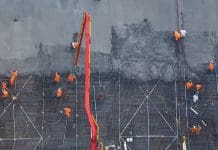Nearly nine in ten construction professionals are concerned about rising inflation depleting confidence in the construction industry and impacting future schemes, says Gleeds winter report
87% of survey respondents said that rising inflation was having an impact on the viability of projects, with just under 70% believing that the current challenges are impacting the growth of the construction industry.
Contractors rated a lack of investor confidence and materials and labour cost escalation as the greatest threats to the industry. As a result, 67% expressed concern that ongoing economic pressure will also negatively impact the industry’s drive toward net zero.
In comparison, 60% were worried that it will influence the pursuit of greater diversity in the built environment.
Product availability has improved despite rising inflation
More positively, the Gleeds winter report did reveal an improvement in the availability of products and materials, with 76% noting a settling of long-term supply issues.
Over half of those questioned also found that materials prices over the same period were beginning to flatten, compared to just 32% in Q3. Labour availability continues to be a problem, however, with 65% experiencing issues and a massive 88% reporting increases in worker rates.
Sustainability and diversity targets suffering as a result of continued economic pressures
Gleeds CEO, Graham Harle, commented: “It’s heartening to see that the squeeze on materials is beginning to ease and that collaboration across the supply chain has continued, however the fact that sustainability and diversity targets may be suffering as a result of continued economic pressures is a concern.
“Threats to viability are worrying, but opportunities do remain for some sectors and a considerable proportion of respondents were of the view that a slow down in the industry may actually go some way to stabilising the industry after a turbulent couple of years. Only time will tell.“
Sector remains hopeful about planned projects
When asked about the impact of the chancellor’s Autumn Statement on the construction industry, only 3% of respondents said that it had been worse than expected.
Despite rumours that the government was re-evaluating and planning to cut major projects to tackle the deficit, pledges included more than £600bn of capital spending over the next five years for schemes including HS2, Northern Powerhouse Rail, East-West Rail, and the New Hospitals Programme.
However, significant pressures remain for departmental capital spending, which will be “maintained in cash terms until 2027/28”, meaning budgets squeezing.














